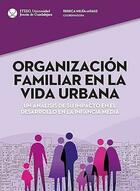The family has undergone a profound transformation in its composition, as well as in the roles and responsibilities of its members, especially those who live in cities. The complexity of today's life, as well as the heterogeneity of families, whose characteristics include being headed by one or two parents, who may be of the same sex, or being headed by grandparents or some other relative, imply a series of problems in the forms of relationships and dynamics of interaction of its members, which affect the development of middle childhood. This book presents the results of extensive research that identifies the way in which contemporary family organization forms are assumed, in order to understand the implications that these new conditions represent in the lives of sons and daughters. Carried out by experts in different social disciplines, it had the support of diverse families and diff...read more
Shopping cart
Loading cart
Important notices
|
|
Recordando a André Rouillé: Su legado en la fotografía André Rouillé 1948 - 2025 |
|
|
Libros de filosofía y co. Disponibles en Librería Herder |
|
|
Revista Filosofía & Co. nº 9 Nueva revista de filosofia divulgativa y actualidad |
|
|
"Espacios de la filosofía" - Mauricio Beuchot - Novedad Herder México |
|
|
Revista Filosofía & Co. nº 8 Nueva revista de filosofia divulgativa y actualidad |
Pay safely with:


In the webshop
New
|
|
Fenomenología queer 68032 $420.00 -0.00% $420.00 |
|
|
Atención transtornada 68500 $470.00 -0.00% $470.00 |
|
|
Porsiemprismo 68037 $320.00 -0.00% $320.00 |
|
|
Arte y cosmotécnica 68201 $450.00 -0.00% $450.00 |
|
|
Imperio de la normalidad 68501 $450.00 -0.00% $450.00 |
In the press
Promotions
|
|
Basiswörterbuch 28205 $390.00 -50.00% $195.00 |
|
|
Manual de la Biblia 20641 $2,410.00 -50.00% $1,205.00 |
|
|
Panorama B1.2 Curso 46507 $235.00 -35.00% $152.75 |
|
|
Panorama A1 Ejercicios. Ubungsbuch 39886 $395.00 -37.00% $248.85 |
|
|
Panorama B1 Ejercicios 47046 $475.00 -35.00% $308.75 |






